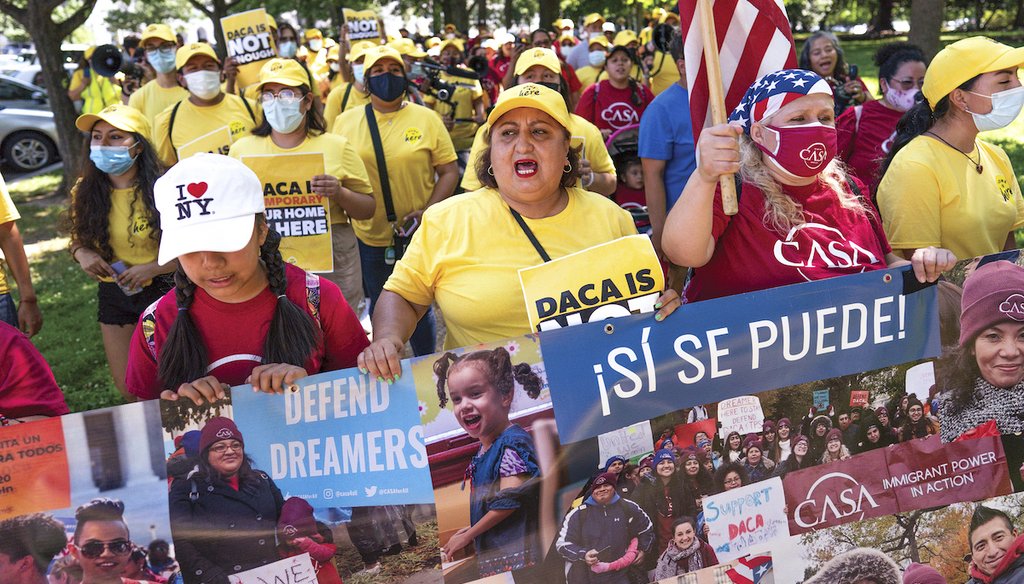Stand up for the facts!
Our only agenda is to publish the truth so you can be an informed participant in democracy.
We need your help.
I would like to contribute

Ingrid Vaca, center, a native of Bolivia, helps to energize activists to rally in support of the Deferred Action for Childhood Arrivals program, also known as DACA, on June 15, 2022. (AP)
If Your Time is short
-
A federal judge in Texas ruled in July 2021 that the Obama administration exceeded its authority when it created DACA. The judge ordered the Department of Homeland Security to stop granting DACA to new applicants but allowed active beneficiaries to keep their protections.
-
DHS appealed that case, and it’s expected to go up to the U.S. Supreme Court.
-
Because DACA is still pending litigation, experts say calling it “illegal” is premature.
A federal appeals court in July is slated to hear arguments over the legality of an Obama-era program that prevents the deportation of immigrants who entered the United States illegally as children.
Despite this pending litigation, Rep. Andy Biggs, R-Ariz., has called the program, Deferred Action for Childhood Arrivals, "illegal."
"Today marks the tenth anniversary of the illegal DACA program," Biggs tweeted June 15. "In 2012, Obama usurped Congress’ unambiguous authority to make immigration laws to implement this program. Rewarding people who violate our laws only encourages additional lawbreaking."
Today marks the tenth anniversary of the illegal DACA program.
— Rep Andy Biggs (@RepAndyBiggsAZ) June 15, 2022
In 2012, Obama usurped Congress’ unambiguous authority to make immigration laws to implement this program.
Rewarding people who violate our laws only encourages additional lawbreaking.
Since its creation, DACA has been the subject of many legal challenges.
In July 2021, a federal judge in Texas ruled that the Obama administration did not follow the law when it created the program.
The Biden administration appealed Judge Andrew S. Hanen’s ruling, and oral arguments are scheduled to begin on July 6 in the 5th Circuit U.S. Court of Appeals. Immigration law experts say the case is likely to end up in the Supreme Court.
"The last word on the legality of DACA obviously has not been said, but DACA today is fully operational for those people who are current recipients of it," said Muzaffar Chishti, a senior fellow at the nonpartisan Migration Policy Institute.
Because a final ruling on the program’s legality is pending, at this point we won’t be rating Biggs’ claim on the Truth-O-Meter. In the meantime, here’s what immigration law experts told us about the program and why it may be "premature" to make a definitive claim about its legality.
Brief overview of the DACA program
DACA was created in a 2012 memorandum issued by former Department of Homeland Security Secretary Janet Napolitano. The program does not grant legal immigration status to its beneficiaries, but it does protect them from deportation and allows them to apply for work permits and a Social Security number.
These protections and benefits are provided in two-year renewable intervals.
To qualify for DACA, a person must have arrived in the U.S. before their 16th birthday and before June 15, 2007. Immigrants are ineligible for the program if they have been convicted of a felony, a significant misdemeanor like domestic violence or sexual abuse, or three or more misdemeanor offenses. They also cannot be deemed a threat to national security or public safety.
DACA’s legality is under review
Hanen ruled that by creating DACA, the Obama administration violated the Administrative Procedure Act — a law that describes how federal agencies can make and enforce regulations. He said the administration exceeded the executive branch’s authority on immigration policymaking.
Agencies can create rules based on the laws Congress passes. This can be done through informal guidance, which is how DACA was created, or through a formal rulemaking process, which Hanen says should have been done.
Hanen’s ruling on DACA’s legality left room for DHS to adjust the program.
Hanen ordered DHS to stop granting DACA protections to new applicants but allowed the more than 600,000 active DACA recipients to keep their protections. He also said DHS could keep granting two-year renewals for these immigrants while the legal case makes its way through the courts.
"This seems at odds with a wholesale conclusion that the DACA program is illegal," said Tom Wong, a political science professor at the University of California San Diego.
In response to Hanen’s ruling, DHS in September 2021 opened a 60-day public comment period on a proposed rule "that would preserve and fortify" DACA. The new rule would make applying for DACA and a work permit two separate processes instead of one. This public comment period complies with the guidelines for rulemaking.
DHS is responsible for crafting a final regulation. The final version of the regulation hasn’t been published, and it’s unclear whether this would influence a decision from the federal appeals court.
Given DHS’s actions in response to Hanen’s ruling and the upcoming appeals case, Biggs’ classification of DACA as "illegal" is premature and a possible overstatement, said Anil Kalhan, a law professor at Drexel University.
Previous Supreme Court cases did not rule on DACA’s legality
The Trump administration tried to end DACA in 2017. Jeff Sessions, the attorney general at the time, said DACA was an "unconstitutional exercise by authority of the executive branch."
The University of California system sued DHS over its decision to rescind DACA, and the U.S. Supreme Court in a 5-4 decision ruled against DHS, saying it failed to provide an adequate reason for DACA’s termination.
In that 2020 case, the Supreme Court ruled on the legality of the Trump administration to end the program, not on the legality of DACA itself.
In 2014, Texas and 25 other states sued the Obama administration over the implementation of an expanded version of DACA and of another deportation reprieve program, Deferred Action for Parents of Americans and Lawful Permanent Residents, or DAPA. (DAPA never went into effect due to a court order.
The Supreme Court in 2016 delivered a split 4-4 ruling, leaving in place a lower court’s decision that blocked the expansion of DACA and creation of DAPA. (Only eight justices ruled on that case because Justice Antonin Scalia died months before the decision was issued.)
"The highest court in the country, on two separate occasions, has not reached a conclusion on the legality or illegality" of DACA, Kalhan said.
In 2017, more than 100 immigration law experts sent President Donald Trump a letter arguing in favor of DACA’s legality. They said DACA was "a lawful exercise of prosecutorial discretion."
"Our conclusions are based on years of experience in the field and a close study of the U.S. Constitution, administrative law, immigration statuses, federal regulations and case law," the letter said.
Shoba Sivaprasad Wadhia, a law professor at Penn State University who signed the letter, told PolitiFact that the ruling from the federal judge in Texas "is not the first or last word on DACA."
Our Sources
Phone interview with Muzaffar Chishti, senior fellow and director, Migration Policy Institute office at NYU School of Law, June 22, 2022
Phone interview with Anil Kalhan, professor of law at Drexel University, June 22, 2022
Email exchange with Tom K. Wong, associate professor of political science at University of California San Diego, June 22, 2022
Email exchange with Shoba Sivaprasad Wadhia, professor of law and director of Center for Immigrants’ Rights Clinic at Penn State University, June 22, 2022
Email exchange with Matthew Tragesser, communications director for Rep. Andy Biggs, June 17, 2022
Andy Biggs, Twitter Post, June 15, 2022
United States District Courts, Texas vs. United States, ET AL (2021)
USA Facts, How many DACA recipients are there in the United States?, November 10, 2019
Britannica, Administrative Procedure Act (1946)
Migration Policy Institute, At its 10th anniversary, DACA faces a tenuous future despite societal benefits, June 9, 2022
U.S. Department of Homeland Security memorandum, June 15, 2012
PolitiFact, What have courts said about the constitutionality of DACA?, September 11, 2017
PolitiFact, Donald Trump says some DACA recipients are ‘very tough, hardened criminals.’ That’s False, November 14, 2019
Court and Special Hearings Calendars, accessed June 22, 2022
Homeland Security website, DHS to Publish Notice of Proposed Rulemaking on DACA, September 27, 2021
C-Span, Attorney General Session on DACA Program, September 5, 2017
PennState Law letter, August 14, 2017
USCIS, Frequently Asked Questions, accessed June 27, 2022
Federal Register, A Guide to the Rulemaking Process, accessed June 27, 2022



































